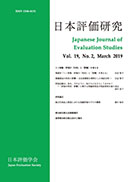Volume 19, Issue 2
Displaying 1-4 of 4 articles from this issue
- |<
- <
- 1
- >
- >|
Special Issue: Use and Influence of Evaluations
-
2019Volume 19Issue 2 Pages 1
Published: March 29, 2019
Released on J-STAGE: June 01, 2023
Download PDF (132K) -
2019Volume 19Issue 2 Pages 3-18
Published: March 29, 2019
Released on J-STAGE: June 01, 2023
Download PDF (758K) -
2019Volume 19Issue 2 Pages 19-34
Published: March 29, 2019
Released on J-STAGE: June 01, 2023
Download PDF (519K)
Article
-
2019Volume 19Issue 2 Pages 35-48
Published: March 29, 2019
Released on J-STAGE: June 01, 2023
Download PDF (1090K)
- |<
- <
- 1
- >
- >|
